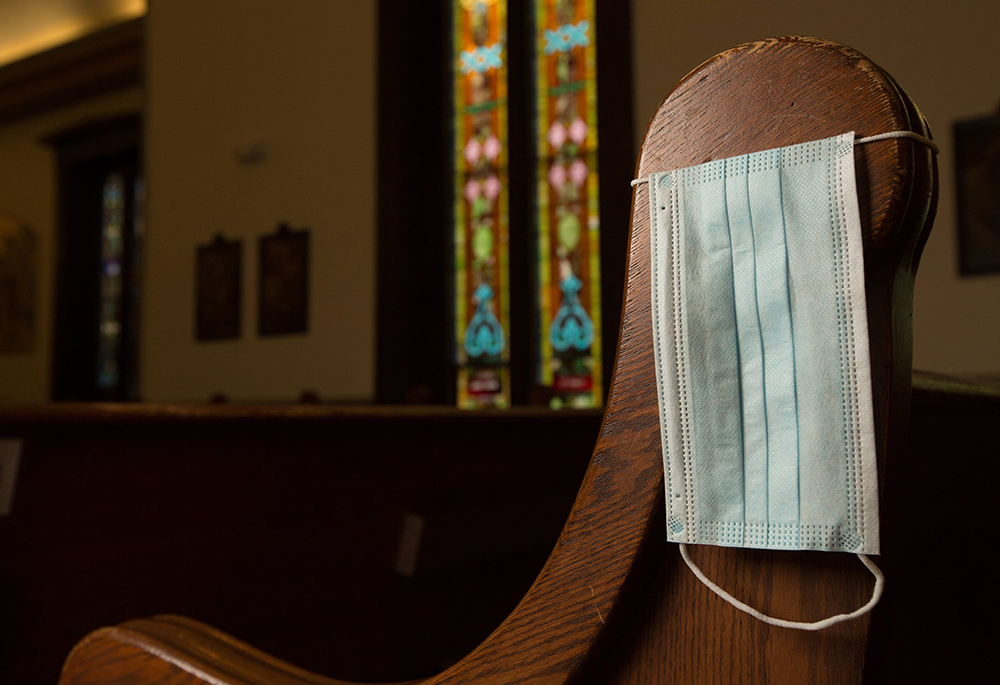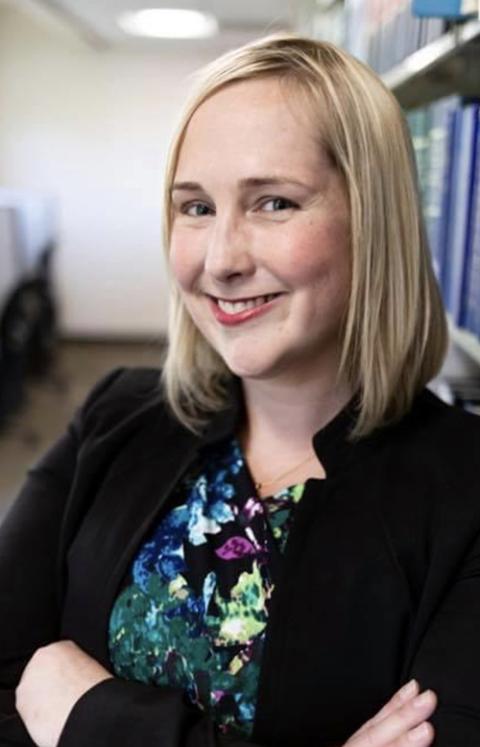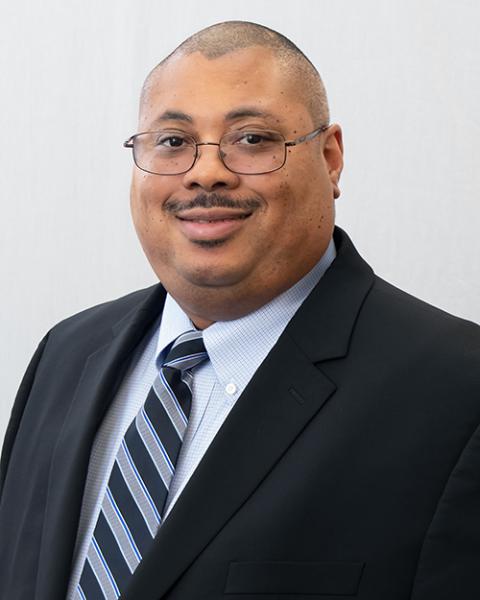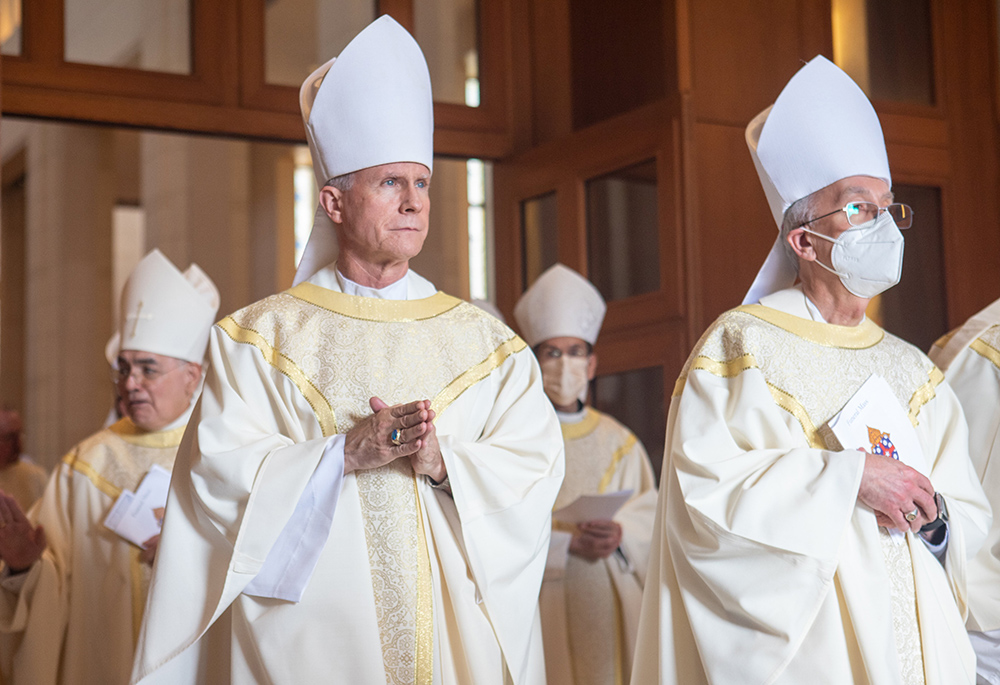
In this illustration photo, a disposable medical mask hangs on the side of a pew. (CNS/The Catholic Spirit/Dave Hrbacek)
Last summer, Katherine Macfarlane got COVID-19. To give her body a chance to fight off the virus, for five weeks while she was sick she had to stop taking the immunosuppressant medications that control her rheumatoid arthritis and chronic eye inflammation.
When Macfarlane stops taking her medication, her vision weakens to the point where she struggles to read or drive safely and her joint swelling makes it hard to shower or get out of bed. "It was really scary," said Macfarlane in a recent NCR interview, explaining that her ability to live independently "was starting to feel compromised."
Knowing her risks for COVID infection, Macfarlane works from home and doesn't socialize much, but she couldn't prevent her doctor's office from ending its masking requirement. "I really fought hard to keep myself safe, and I think I got COVID at a doctor's appointment," she said.
Studies have found that, in a situation when an infectious person is speaking with another person, that second person is significantly more protected when both people are wearing a mask, rather than when they are the only one masking. COVID-19 is frequently spread by asymptomatic people who may not know they are infectious.

Katherine Macfarlane (Courtesy of Katherine Macfarlane)
Macfarlane is now working with a strength trainer to try to regain some of her baseline health. "It was one of those humbling experiences where I felt grateful to be alive at the end of it," she said, acknowledging that her financial privilege and medical literacy helped her recovery.
Her continuing isolation takes a toll. "My life feels like it can't get any smaller," Macfarlane said, also expressing gratitude for what she still can do.
As the fourth year of the pandemic begins this March and many political and church leaders turn their attention away from COVID-19, high-risk and COVID-vulnerable Catholics say they feel abandoned by the government and the church.
"Today, COVID no longer controls our lives," President Joe Biden declared during his February State of the Union address to Congress. In January, Biden announced that the U.S. would end the COVID-19 public health emergency on May 11, which will lead to greater out-of-pocket costs for people seeking COVID-19-related medical treatment.
The Centers for Disease Control and Prevention still recommends that immunocompromised people wear well-fitting, high-quality masks and avoid poorly ventilated and crowded indoor spaces.
Scientists estimate that nearly 3% of Americans are immunocompromised, but the CDC lists a much more extensive list of medical conditions that continue to place people at higher risk of severe illness from COVID-19.
In late January, the Food and Drug Administration removed Evusheld, a critical drug for preventing COVID-19 infections in people with weakened immune systems, from the market because it is no longer effective against current variants. There are still effective antiviral treatments available, like Paxlovid, but some doctors are reluctant to prescribe it as experts advise, leading to access issues for patients.
Some public health experts have criticized Biden's approach to the pandemic in recent months.
"This sense that there is nothing else to be done and there was nothing else to be done is not borne out by comparing the United States to other countries," said Matthew Kavanagh, who directs Georgetown University's Global Health Policy & Politics Initiative at the O'Neill Institute for National and Global Health Law.
Advertisement
According to the World Health Organization, more than 1.1 million of the over 6.8 million people who have died of COVID-19 have been in the U.S., meaning Americans have disproportionately died of COVID-19.
Last week (the week of March 1), 2,290 people in the U.S. died of COVID-19.
Death isn't the only continuing risk from COVID-19. The U.S. Census Bureau and the National Center for Health Statistics estimate that 5.8% of American adults currently have long COVID, defined as new symptoms lasting three months or longer after having a COVID-19 infection. 25.3% of people who currently have long COVID experience significant limitations in their day-to-day activities, according to statistics available March 9.
"Economically equal societies have actually seen significantly better outcomes than the United States has," Kavanagh said.
Kavanagh highlighted that other countries have focused on disease responses beyond vaccines, including masking on public transit and tracing cases.
"We remain deeply unprepared when it comes to responding to pandemics," Kavanagh said.
Cory Mitchell, system director of ethics at PeaceHealth healthcare system and a candidate in the Secular Franciscan Order, agreed with Kavanagh that inequality continues to threaten our health.
"I hope our three-year experience will help us see that we need a recovery plan for communities of concentrated poverty," Mitchell said in an email.

Cory Mitchell (Courtesy of Cory Mitchell)
"We need whole functioning ecosystems with affordable, high quality, mixed-income, mixed-use, aesthetically pleasing development that allows all to flourish with meaningful educational, occupational and recreational opportunities," Mitchell said, calling Catholics and Catholic health care to continue advocating for the common good.
Kavanagh criticized the U.S. for attempting to end the pandemic by acting within U.S. borders instead of focusing on global cooperation. He said that a virus that rampages out of control in another part of the world can develop new variants that then become dangerous for Americans.
"We have seen the United States government buy up and hoard stocks of vaccines, but we've also seen the United States government hoard stocks of diagnostics," he said.
"The Vatican has actually been one of the few deeply moral voices in the world when it comes to things like vaccine equity," said Kavanagh.
Pope Francis has called for universal access to COVID-19 vaccines and promoted vaccination as a "moral obligation."
Today, only 67% of the global population is fully vaccinated. In Senegal, Madagascar, Papua New Guinea, Haiti, Yemen and Burundi less than 10% of the population is fully vaccinated.
Kavanagh said that the "mobilization of Catholic communities to demand that leaders in the United States really put the interests of people in other countries on par with our own is really important."
In the U.S., the COVID-19 pandemic has deeply reshaped how disabled Catholics interact with the church.
Amanda Martínez Beck, who developed long COVID after being hospitalized with COVID-19 for 40 days in October of 2020, hasn't gone back to Mass since the pandemic began. She struggles with fatigue, brain fog, breathing difficulties, and recovery from even minor illnesses, like colds.
Beck has been frustrated with how her bishop, Joseph Strickland of Tyler, Texas, has approached the pandemic.

Bishop Joseph Strickland of Tyler, Texas, left, and second from left, and Bishop Mark Seitz of El Paso, Texas, process out of the Co-Cathedral of the Sacred Heart in Houston Dec. 31, 2021, following the funeral Mass of Galveston-Houston Auxiliary Bishop George Sheltz. (CNS/Texas Catholic Herald/James Ramos)
Strickland has cast doubt on the safety of COVID-19 vaccines and opposed mandating them. He has also argued against the general dispensation for missing Mass during the beginning of the pandemic, saying that the exceptions for sick people should suffice. Strickland lifted that dispensation in March of 2021 before many other bishops.
Beck says a combination between Strickland's politics and the lack of safety and understanding in Catholic churches led her family to attend a smaller Protestant church.
"I lament that I've had to find a different church to worship in because of politics and because of response to COVID," said Beck. "It's very tender for me."
Beck said that, even though she knows masking isn't pointless, she made the decision not to mask when she went back to teaching college Spanish part-time this fall. "It's a cultural thing, I guess, to feel very alone in your masking, and I just decided not to do that anymore," she said.
Macfarlane also hasn't been to Mass since the beginning of the pandemic. Recently, she's looked to see if there are masked Masses, but there are no local options for her other than receiving Communion in the church parking lot.
"I miss communal prayer. I miss the rhythm of Mass. I miss the sign of peace," said Macfarlane. "I can't imagine getting Communion seated in my car. It almost would feel heretical to do it."
Living in Idaho and Louisiana during the pandemic, she says she hasn't felt welcome in Catholic spaces. "As a Catholic, I've been horrified by people resisting getting vaccinated," she said.
Macfarlane and Beck both suggested that having a masked Mass option for high-risk people would encourage those groups to re-engage with the church.
Beck also recommended that Catholic churches show more grace to chronically ill people who struggle with Mass attendance.
"If your faith doesn't account for the needs of the most vulnerable people in your community, what does your faith mean?" Macfarlane asked.





